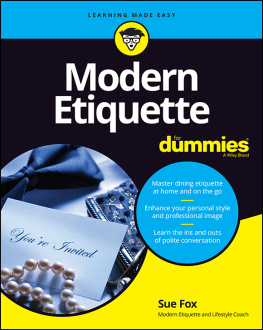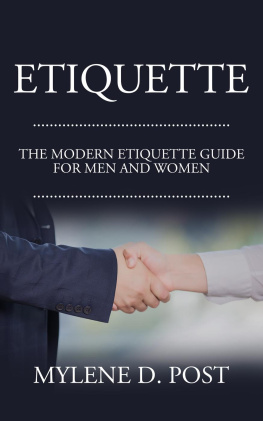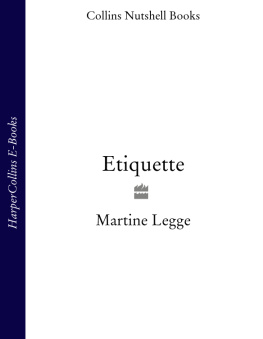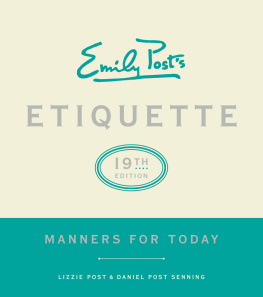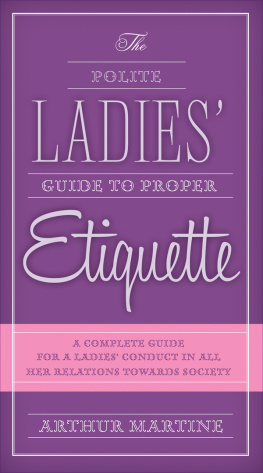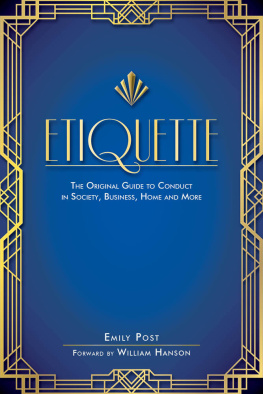MARTINE'S HAND-BOOK OF ETIQUETTE
AND GUIDE TO TRUE POLITENESS
* * *
ARTHUR MARTINE
*
Martine's Hand-Book of Etiquette
And Guide to True Politeness
First published in 1866
ISBN 978-1-62013-593-8
Duke Classics
2014 Duke Classics and its licensors. All rights reserved.
While every effort has been used to ensure the accuracy and reliability of the information contained in this edition, Duke Classics does not assume liability or responsibility for any errors or omissions in this book. Duke Classics does not accept responsibility for loss suffered as a result of reliance upon the accuracy or currency of information contained in this book.
Contents
*
Hand-Book of Etiquette, and Guide to True Politeness
*
A COMPLETE MANUAL FOR THOSE WHO DESIRE TO UNDERSTAND THE RULES OF GOOD BREEDING, THE CUSTOMS OF GOOD SOCIETY, AND TO AVOID INCORRECT AND VULGAR HABITS,
CONTAINING
Clear and Comprehensive Directions for Correct Manners, Dress, and Conversation;
Instructions for Good Behavior at Dinner Parties, and the Table, with Hints on the Art of Carving and Taking Wine at Table;
Together with the Etiquette of the Ball and Assembly Room, Evening Parties;
Deportment in the Street and when Travelling;
And the Usages to be Observed when Visiting or Receiving Calls.
TO WHICH IS ADDED
THE ETIQUETTE OF COURTSHIP, MARRIAGE, DOMESTIC DUTIES, AND FIFTY-SIX RULES TO BE OBSERVED IN GENERAL SOCIETY.
General Observations
*
Politeness has been defined as an "artificial good-nature;" but it wouldbe better said that good-nature is natural politeness. It inspires uswith an unremitting attention, both to please others and to avoid givingthem offence. Its code is a ceremonial, agreed upon and establishedamong mankind, to give each other external testimonies of friendship orrespect. Politeness and etiquette form a sort of supplement to thelaw, which enables society to protect itself against offences which thelaw cannot touch. For instance, the law cannot punish a man forhabitually staring at people in an insolent and annoying manner, butetiquette can banish such an offender from the circles of goodsociety, and fix upon him the brand of vulgarity. Etiquette consistsin certain forms, ceremonies, and rules which the principle ofpoliteness establishes and enforces for the regulation of the mannersof men and women in their intercourse with each other.
Many unthinking persons consider the observance of etiquette to benonsensical and unfriendly, as consisting of unmeaning forms, practicedonly by the silly and the idle; an opinion which arises from their nothaving reflected on the reasons that have led to the establishment ofcertain rules indispensable to the well-being of society, and withoutwhich, indeed, it would inevitably fall to pieces, and be destroyed.
The true aim of politeness, is to make those with whom you associate aswell satisfied with themselves as possible. It does not, by any means,encourage an impudent self-importance in them, but it does whatever itcan to accommodate their feelings and wishes in social intercourse.Politeness is a sort of social benevolence, which avoids wounding thepride, or shocking the prejudices of those around you.
The principle of politeness is the same among all nations, but theceremonials which etiquette imposes differ according to the taste andhabits of various countries. For instance, many of the minor rules ofetiquette at Paris differ from those at London; and at New York they maydiffer from both Paris and London. But still the polite of every countryhave about the same manners.
Of the manners and deportment of both ladies and gentlemen, we wouldremark that a proper consideration for the welfare and comfort of otherswill generally lead to a greater propriety of demeanor than any ruleswhich the most rigid master of etiquette could supply. This feeling,however, is one that must be cultivated, for the promptings of natureare eminently selfish, and courtesy and good-breeding are onlyattainable by effort and discipline. But even courtesy has limits wheredignity should govern it, for when carried to excess, particularly inmanner, it borders on sycophancy, which is almost as despicable asrudeness. To overburden people with attention; to render themuncomfortable with a prodigality of proffered services; to insist uponobligations which they do not desire, is not only to render yourselfdisagreeable, but contemptible. This defect of manners is particularlyprevalent in the rural districts, where the intense effort to render avisitor comfortable has exactly the contrary effect; besides, there arethose whose want of refinement and good breeding often leads them to anunwarrantable familiarity, which requires coldness and indifference tosubdue.
Much misconstruction and unpleasant feeling arises, especially incountry towns, from not knowing what is "expected," or necessary to bedone on certain occasions, resulting sometimes from the prevalence oflocal customs, with which the world in general are not supposed to beacquainted. "To do in Rome as the Romans do," applies to every kind ofsociety. At the same time, you can never be expected to commit a seriousbreach of manners because your neighbors do so.
But what you should do, and what not, in particular cases, you willlearn in the following chapters. I have only now to say, that if youwish to be agreeable, which is certainly a good and religious desire,you must both study how to be so, and take the trouble to put yourstudies into constant practice. The fruit you will soon reap. You willbe generally liked and loved. The gratitude of those to whom you havedevoted yourself will be shown in speaking well of you; you will becomea desirable addition to every party, and whatever your birth, fortune,or position, people will say of you, "He is a most agreeable andwell-bred man," and be glad to introduce you to good society. But youwill reap a yet better reward. You will have in yourself thesatisfaction of having taken trouble and made sacrifices in order togive pleasure and happiness for the time to others. How do you know whatgrief or care you may not obliterate, what humiliation you may not alterto confidence, what anxiety you may not soften, whatlast, but reallynot leastwhat intense dullness you may not enliven? If this workassist you in becoming an agreeable member of good society, I shallrejoice at the labor it has given me.
The Art of Conversation
*
As the object of conversation is pleasure and improvement, thosesubjects only which are of universal interest can be made legitimatetopics of pleasantry or discussion. And it is the gift of expressingthoughts and fancies in a quick, brilliant, and graceful manner on suchtopics,of striking out new ideas, eliciting the views and opinions ofothers, of attaching the interest of all to the subject discussed,giving it, however trifling in itself, weight and importance in theestimation of the hearers, that constitutes the great talent forconversation. But this talent can never, we may safely aver, bedisplayed except in a good cause, and when conversation is carried on ina spirit of genuine charity and benevolence.
We should meet in society to please and be pleased, and not to displaycold and stately dignity, which is as much out of place, as all attemptsto shine by a skillful adherence to the fantastic rules of thesilver-fork school, are puerile and ludicrous. Such little things aregreat to little persons, who are proud of having acquired by rote, whatthe naturally elegant derive, in sufficient measure, from naturally justfeeling.


